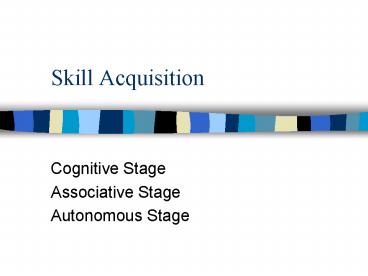Skill Acquisition - PowerPoint PPT Presentation
1 / 13
Title:
Skill Acquisition
Description:
With practice, thinking time decreases according to the power function ... Logan (1988) and production. Alphabet arithmetic. K 1 = L. K 2 = ? K 5 ... – PowerPoint PPT presentation
Number of Views:663
Avg rating:3.0/5.0
Title: Skill Acquisition
1
Skill Acquisition
- Cognitive Stage
- Associative Stage
- Autonomous Stage
2
Skill
- Procedural knowledge
- Acquired with cognitive mediation
- With practice, thinking time decreases according
to the power function - The limit is the cycle time of the instruments
3
Cognitive stage
- Problem solving Newell Simon, 1972
- States, goals, operators, and search/selection
- Operator acquisition Learning by conditioning,
observation, or education - Memory contains many operators
- Selection of operators is by difference reduction
and operator subgoaling
4
Operator selection
- Difference reduction
- Tropisms
- Stochastic analysis
- Umweg problems
- Chess research (DeGroot, 1965f)
5
Operator selection, continued
- Operator subgoaling
- Subgoals are instrumental, not intrinsic
- Can instrumental subgoals become intrinsic?
- The miserly raccoon
- Allports functional autonomy
- Tool building is subgoaling Kohler
- Tower of Hanoi problem
- Role of the frontal cortex
6
The Associative Stage
- Proceduralization For the specific task,
declarative knowledge is converted to procedural
knowledge. - Find the median of 1,3,4,6,7,8,9
- Practice lessens the need for cognitive mediation
in a rehearsal buffer/ rehearsal system - (9X 3) 4
- 5 X
7
The Associative Stage
- In proceduralization, recognition replaces recall
- The recognition strategies are called production
rules - Heuristics for knowing (recognizing) when to
apply a solution strategy. - Like vocabulary learning for a foreign language,
production rules are not reversible. - In other words, practice improves production
rules only in the direction practiced.
8
Logan (1988) and production
- Alphabet arithmetic
- K 1 L
- K 2 ?
- K 5 ?
- Zbrodoff ( 1995) found that the solution time
difference changed with practice. - With practice or experience, problem solving is
exchanged for retrieval.
9
Kinds of production rules
- Novice rules What do I need to know to solve a
particular problem - I need to prepare supper. What ingredients do I
need? (Subgoaling) - Expert rules What do I know that I can use to
solve the problem? - I need to prepare supper. Whats in the
cupboard? - Expert rules reorganize solution strategies.
10
Knowledge and skill
- To be good at a skill, you have to acquire a lot
of knowledge. - It takes time and effort to acquire a lot of
knowledge. - When a certain amount of knowledge is acquired on
a topic, you begin to see patterns. - Pattern recognition facilitates expert rules.
Ericsson et al (1993) No talent.
11
The Autonomous Stage
- Non-cognitive, less interruptible
- The motor program
- Open-loop performance
- Closed-loop performance
- Non-cognitive control
- The monosynaptic stretch reflex 30 msec
- Cerebellar programs 80 msec
- Conscious reaction time 200msec
12
Motor schemas
- Cognitive representations of a motor program
- Generalizable to new tasks
- Different effectors, speed, force
- Improve with practice
- Schmidt (1988) and schemas
- Motor program is recall memory
- Desired outcome is recognition memory
13
Feedback effects
- Motor programs are adjustable with occasional
feedback - Cf. partial reinforcement
- Too much feedback can disrupt learning in any
area - However, timing and force learning may not be
disrupted by constant feedback































